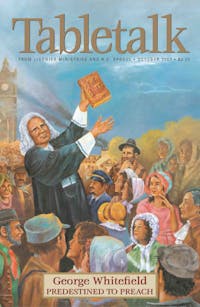
Request your free, three-month trial to Tabletalk magazine. You’ll receive the print issue monthly and gain immediate digital access to decades of archives. This trial is risk-free. No credit card required.
Try Tabletalk NowAlready receive Tabletalk magazine every month?
Verify your email address to gain unlimited access.
Everybody has a strategy for evangelism. Most of us practice what we graciously call “lifestyle evangelism.” There’s nothing wrong with that, as long as our lifestyles actually evangelize. Too often, however, we figure if we don’t use coarse language, and if we smile a lot, then we’ll invite that golden Softball of a question: “What makes you different?” Others practice what is called “friendship evangelism,” stealthily making friends with the worldly. This may be fine, but too often we actually make friends with the world. Still others try the Roman approach. Give the people bread and circuses, power and pap, and then when you’ve got them trapped, give them a candy-coated message.
The truth is, the Bible is rather scant on models for evangelism—but it is not bereft of them. We miss what’s there not so much because not much is there, but because we don’t much like it. Then we try our own wisdom, such as the methods above.
It was Peter who gave the first great evangelistic sermon. One could argue that he used a “current-events” approach, as his sermon began with an explanation of the phenomena of Pentecost. One could argue that he was an astute apologist, for his sermon was replete with Old Testament references, meeting his Jewish hearers where they were. But what made Peter’s approach so effective was that it was so faithful. The Biblical strategy is as powerful as it is brief—we must tell the truth.
This is what people need to know: We are sinners, under the wrath of God. But God, who is rich in mercy, poured His wrath upon the innocent Jesus. Those who repent and throw themselves on God’s merciful provision have their sins covered. Those who are united with Christ will receive His righteousness, a righteousness the Father vindicated in the Resurrection.
George Whitefield, like Peter before him, was a great man because he proclaimed a great Gospel. Before the face of God, coram Deo, we have no glory of our own. Instead, we stand by the glory of the Son. When we stand between the Son and the lost, they will stay in the dark. When, however, we preach Christ, and Him crucified, then dead men begin to walk. As we again hold up a godly example in Whitefield, let us follow his example, and preach the truth.
